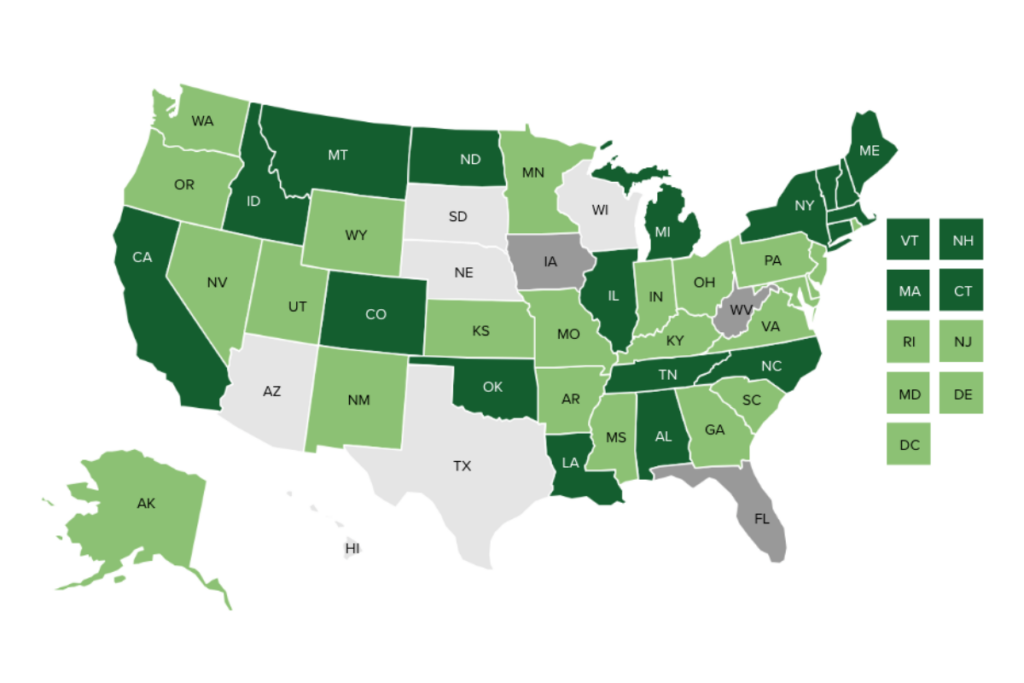Background
Since the beginning of the COVID-19 pandemic, there has been greater attention to state-level public health authority, including legislative and judicial challenges to the ability of states to require vaccinations as a condition of employment or school attendance. Concurrently, large gaps in childhood vaccination rates across the U.S. have persisted — and in some cases worsened — with the Centers for Disease Control and Prevention reporting for the second year in a row that the national measles, mumps, and rubella (MMR) vaccination rate among kindergarten students has fallen below the level needed to prevent community transmission of measles.
NASHP has been tracking state legislative trends around COVID-19 vaccinations since March 2021. In May 2023, the federal government ended the federal public health emergency and states also took various actions to ease or eliminate COVID-19 related requirements. As most 2023 state legislative sessions have concluded, this report aims to highlight the types of state-enacted legislation related to vaccinations that emerged from these past sessions and provide insights on how the current trends compare with COVID-19-related state legislation enacted in prior years.
Notably, while hundreds of vaccine-related bills were introduced, only a handful were enacted into law. Many of the vaccine-related bills introduced in 2023 reflect similarities to legislation enacted in 2021 and 2022, such as limitations on COVID-19 mandates for public and private sector employees and in schools, as well as requirements for vaccine mandate exemptions based on medical, religious, and philosophical reasons. However, the vaccine-related bills enacted during the 2023 state legislative sessions have focused on routine immunizations and limitations on private entities.
For more information on state vaccine-related legislation, see NASHP’s 50-state legislative trackers, State Efforts to Limit or Enforce COVID-19 Vaccine Mandates and States Address School Vaccine Mandates.
Major Categories and Trends in Vaccine-Related Legislation
The following categories reflect the major types of bills enacted during the 2023 legislative session. Within each category, we highlight trends of recently enacted legislation compared with other similar laws passed during the COVID-19 pandemic.
Legislation prohibiting public and private entities from discriminating based on vaccination status
A majority of state laws enacted in the past few years related to COVID-19 vaccines center around the ability of public entities and private businesses to mandate vaccination — either as a condition for employment or access to goods and services. By the end of 2021, at least 22 states and Washington, DC, required government employees to be vaccinated against COVID-19 or undergo regular COVID-19 testing. Additionally in 2021, two states passed bans on COVID-19 vaccination mandates for all private employers and 10 states passed bans on COVID-19 vaccination mandates for state workers. With the end of the COVID-19 public health emergency on May 11, 2023, most states have ended their COVID-19 vaccination mandates. Further, some states are proceeding to limit the ability of public and private entities to require COVID-19 vaccinations.
As has been the trend in recent years, several states in 2023 enacted legislation limiting the authority of governmental entities to require COVID-19 vaccination. For instance, Texas enacted SB 29, which prohibits governmental entities from implementing COVID-19 vaccination mandates and from requiring the closure of a private business or school to prevent the spread of COVID-19. In Texas’s general appropriations bill this year, the state also barred any state general revenue or federal funds appropriated to the Department of State Health Services during the 2024–2025 biennium from being used for the purpose of promoting or advertising COVID-19 vaccinations.
In 2023, more states enacted legislation limiting the authority of private businesses to require vaccinations.
Although in prior years a handful of states had passed legislation that prohibits private businesses from requiring proof of COVID-19 vaccination, the 2023 session saw a large uptick in states enacting these bills, for a total of 11 states currently limiting the authority of private businesses to require vaccinations. Among them:
- Idaho enacted SB 1130, which prohibits government entities from requiring proof of COVID-19 vaccination or from offering different compensation or benefits to an employee based on whether the employee has received a COVID-19 vaccine (this excludes some one-time incentives related to COVID-19 vaccines). The law further prohibits private business entities from requiring COVID-19 vaccination for employment or access to goods or services. This prohibition includes ticket issuers, who are not allowed to deny access to entertainment based on COVID-19 vaccination status.
- In Utah, HB 131 prohibits governmental entities from requiring any individual to receive any vaccination and denying to an individual any local or state “service, good, facility, advantage, privilege, license, educational opportunity, health care access, or employment opportunity” based on the individual’s vaccination status. Additionally, under HB 131 it is a discriminatory practice for any employer, including private businesses, to require proof of immunity status. The prohibitions in this law do not apply to schools and child care centers.
In 2023, the focus of vaccination legislation has expanded to areas beyond employment or access to goods and services.
Though most prior legislation prohibiting discrimination based on COVID-19 vaccination status has been oriented around proof of vaccination as a condition of employment or access to goods and services, during the 2023 legislative session there was also a focus on preventing any vaccination mandate as a condition of specific activities, such as adoption, organ transplants, and hospital visitation. For example:
- Montana’s SB 308 prohibits care facilities (defined as a hospice, hospital, or long-term care facility) from imposing limitations on visitation on the basis of a visitor’s vaccination status or requiring a visitor to receive any vaccination. Another piece of legislation from Montana, HB 684, bars vaccination status from being used as evidence or grounds for decisions in certain administrative and legal proceedings related to child support, child custody, visitation, or parental rights.
- In Indiana, SB 345 prohibits licensed child placing agencies from requiring that an individual or a member of the individual’s household receive an immunization as a condition for obtaining an adoption.
- Texas HB 44 prohibits providers from refusing to provide health care services to Medicaid recipients or child health plan program enrollees on the basis of immunization status.
Legislation limiting authority to mandate vaccination in schools
Beginning in 2021, many states enacted legislation focused on COVID-19 vaccinations and masks in schools. By December 2021, 17 states had enacted a statewide ban on student COVID-19 vaccination mandates, straddling both K–12 and higher education levels. There are no states that currently require students to be vaccinated against COVID-19 on a statewide basis. Previously, Washington, DC, Louisiana and California made plans to mandate COVID-19 vaccinations in schools, but the states later removed these measures. From August 2021 through July 2022, Illinois had a COVID-19 vaccination mandate that applied only to students at institutions of higher education.
In 2023, some school-related bills reflected a greater focus on routine vaccination requirements.
During the 2023 legislative session, a number of states enacted laws that prohibit schools from requiring proof of COVID-19 vaccination, and a few of these state laws extended to other types of vaccinations.
- Tennessee enacted SB644/HB252, which provides that parent-teachers of home school students are not required to provide proof of the student’s immunizations and receipt of health services or examinations that are required by law for children attending public school.
- In Wisconsin, legislators blocked Governor Tony Evers administration’s plan to require seventh grade vaccinations against meningitis and tighten student chickenpox vaccination requirements.
Legislation expanding exemptions to vaccination requirements
In recent years, many states have taken actions to require that public and private entities provide new types of exemptions from COVID-19 vaccination mandates. According to Immunize.org’s map of state exemption laws for routine immunizations, all 50 states and DC allow medical exemptions and most allow religious exemptions. In 2021 and 2022, we saw many examples of states adding moral and philosophical exemptions from COVID-19 vaccinations.
Religious exemptions continue to be a focus of state legislation and judicial challenges. Florida enacted legislation that requires business entities to allow religious exemptions from any vaccination requirement (see below). In Mississippi, a state that has led the nation in child immunization rates as one of the six states without non-medical exemptions, a federal judge recently ruled that parents can opt out of vaccinating their children for school on account of religious beliefs. In contrast, a handful of states are also looking to remove their religious exemptions to address barriers to vaccine access. For instance, Connecticut recently eliminated their religious exemption after a federal appeals court upheld a 2021 law that eliminated religious vaccination exemptions from childhood immunization requirements for schools, colleges, and day care facilities.
In 2023, some exemption legislation focused on all vaccinations and both public and private entities.
This year’s sessions spurred additional legislation that requires medical, religious, and/or philosophical exemptions from any vaccination, beyond solely COVID-19 vaccinations. Additionally, in contrast with prior years, much of the recently enacted exemption legislation centers around private business entities and not only on governmental agencies. For example:
- Florida SB 252 requires that business entities provide exemptions from any vaccination requirement based on religious and medical reasons.
- Montana enacted HB 715, which requires that any communications from a school regarding immunizations must include information about the available exemptions and include copies of or links to exemption forms. This law also requires schools and the governing authority to accept all requests and removes the department of health’s authority to deny requests for exemptions from student immunization requirements.
- Idaho’s SB 1005 requires licensed day care facilities to describe the immunization exemption law in communications with parents.
Legislation expanding pharmacist scope of practice for vaccine administration
Over the past several legislative sessions, over a dozen states have passed laws that expand pharmacist authority to administer vaccines and address barriers to accessing COVID-19, influenza, and other routine vaccinations. Expanding access to vaccines in non-traditional provider settings can be an effective tool for states in increasing vaccination rates, particularly for children and adolescents who do not have a medical home or face barriers to accessing a primary care provider during regular hours. Pharmacies can be a critical vaccination partner — they often operate seven days a week and frequently have evening and weekend hours and they do not require an established relationship with the patient.
The amended Public Readiness and Emergency Preparedness Act (PREP Act) of 2020 authorizes pharmacists to order and administer approved COVID-19 and seasonal influenza vaccines to children ages three to 18 through December 2024. During the 2023 legislative session, many states pursued legislation that extends the impact of the PREP Act and the scope of practice for pharmacists, pharmacy interns, and pharmacy technicians or expands the age group for which pharmacists are authorized to administer vaccines. For instance:
- In Maine, LD 1151 (SP 478) allows a registered pharmacy technician working under the supervision of a pharmacist to administer vaccines. This bill also lowers the minimum age of a person to whom a pharmacist may administer influenza vaccines without a prescription from seven to three. It authorizes a pharmacist to administer other vaccines recommended by the federal Advisory Committee on Immunization Practices to a person three or older with a valid prescription. This bill also requires that a pharmacist provide a written immunization record to the person receiving a vaccine, notify the person’s primary care provider within 72 hours of administering the vaccine, and report the administration of the vaccine to the state immunization registry within 72 hours of administering the vaccine.
- Michigan SB 219 allows a pharmacist to order and administer a vaccine to individuals three and older without the supervision of a physician, following completion of an approved training. All providers in Michigan are already required to report pediatric vaccinations to the state’s immunization registry, and SB 219 further requires that pharmacists must report immunizations administered to individuals 20 or older to the state’s immunization registry within 72 hours.
Key Takeaways
As the above themes emerging from the 2023 legislative sessions demonstrate, state legislation regarding immunizations has included efforts to both strengthen vaccination efforts and limit public and private entities from requiring COVID-19 and some additional vaccinations. With recent reductions in federal funding anticipated by state immunization programs and continued misinformation circulating around vaccines, there is a need to rebuild trust and identify key partners in these efforts. NASHP will continue to support states in addressing these challenges and identifying new opportunities to educate and engage populations around vaccine-preventable diseases.




